So you want to delist one of your NFTs on OpenSea?
Did one of your favorite NFT collections just enter a new bull market and you’re afraid that the current list price of your NFT is too low?
There are many reasons why one would want to delist an NFT.
The problem is that it’s not always clear whether you’ll have to pay OpenSea gas fees or not and that’s so many people are trying to figure out how to delist on OpenSea.
In this article, you’ll learn multiple ways you can delist your NFTs on OpenSea including which methods will cost you gas and which ones are for free.
Let’s get started.
Key Points (tl;dr)
- You can delist any NFT that you’ve previously listed on OpenSea. Some listings will automatically expire while others need to be actively canceled.
- Actively canceling a listing on OpenSea comes at a cost. You will have to pay the gas fees for processing the transaction.
- There are 3 recommended ways to delist on OpenSea.
- Method 1: Proactively cancel and pay gas
- Method 2: Wait for the listing to expire by itself
- Method 3: Delete the NFT completely (if you’re the creator)
- There is a 4th method which involves transferring the NFT into a different wallet. However, this is not recommended as the old listing still remain active in the old wallet.
Like this content? Then share it!
Solved: How to Delist on OpenSea the Right Way
www.tokenizedhq.com
Here’s the answer. Great article by @ChrisHeidorn right here: https://tokenizedhq.com/how-to-delist-on-opensea/
Can You Delist on OpenSea?
Yes, you can delist an NFT from OpenSea. The exact process of how to delist on OpenSea depends on whether you created the NFT yourself and how you listed it in the first place. This also determines whether you will incur any costs for delisting or not.
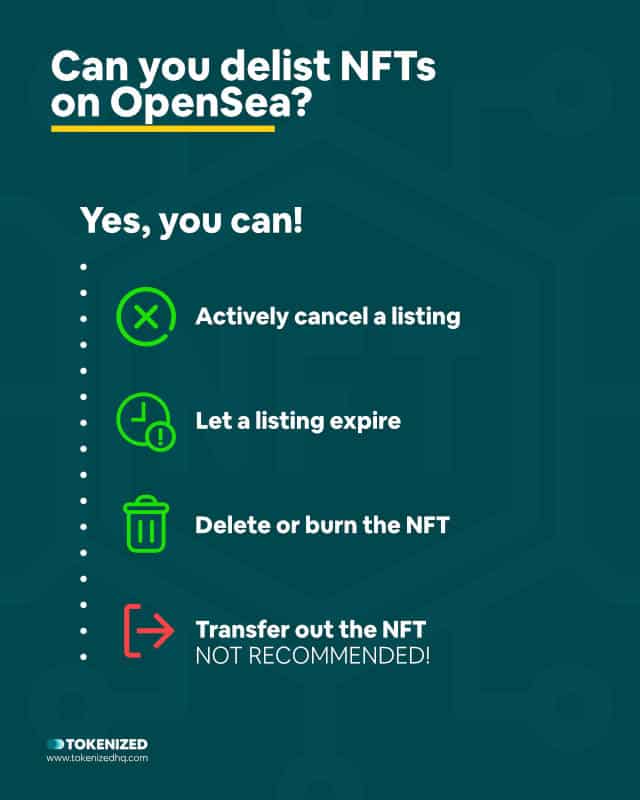
Let’s say you purchased an NFT some time ago for roughly 0.1 ETH or maybe you even minted it for free.
Perhaps you decided to list your NFT for sale on OpenSea at a price of 1 ETH.
You assumed that a 10x return on your initial investment is absolutely great and if the floor price of the collection ever reached that point, you’d be ecstatic and take profits.
But then the project really started to take off, much more than you had ever expected.
In a massive bull run, the floor rises to 0.8 ETH and then 0.9 ETH.
You start receiving the first unsolicited bids and that’s when you start to get nervous.
You try to remember how to accept an offer on OpenSea, but don’t actually pull the trigger.
You start to think about how disappointed you’d be if you sell your NFT for 1 ETH and the floor price eventually reaches 3 or maybe even 4 ETH.
You throw all your principles and NFT investment strategy out the window because you think the project is going to the moon.
So you ask yourself: Can I delist my NFT from OpenSea so that it doesn’t sell at the current price?
And the answer is: Yes you can.
There are multiple ways to do this and we tackle all 3 of them in this article.
Does It Cost to Delist on OpenSea?
Yes, it does. Unless you are the creator and owner of an NFT or listed it with an early expiry date, delisting on OpenSea will cost you gas fees for processing that transaction on the blockchain.
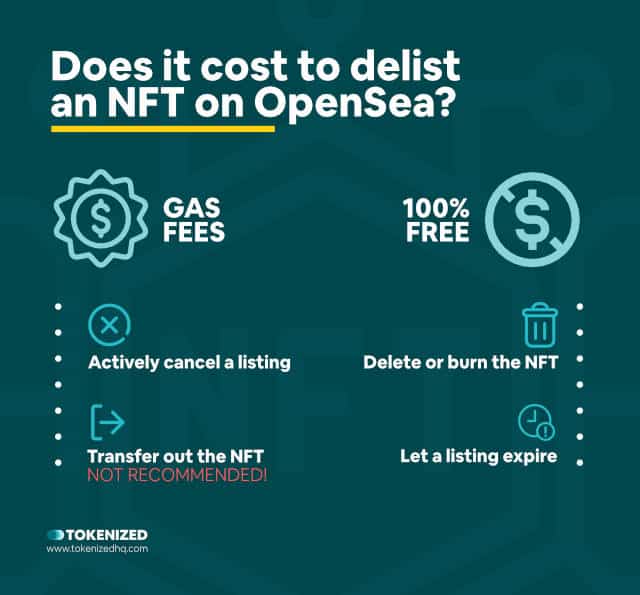
Delisting sounds like a really easy process and technically it is.
The problem is that depending on what you listed and how you originally listed the NFT will determine whether delisting on OpenSea will come at a cost or not.
You see while listing an NFT for sale on OpenSea is free, proactively canceling an existing listing will cost you gas fees.
And depending on the current price of gas, that might turn out to be an extremely costly decision.
Before you make that decision, you should always check the current cost of gas.
Rarible Analytics is a really good tool, not only for checking Rarible gas fees but also the fees on OpenSea.
There are ways to avoid these costs, but that depends on whether you originally created the NFT yourself or listed it with a short expiry date.
In most cases, actively canceling a listing will come at a cost.
How to Delist on OpenSea
So let’s show you how to delist on OpenSea.
Delisting an NFT on OpenSea is a lot easier than you might think.
However, the exact method you must follow depends on your specific circumstances.
Here are 3 methods that teach you how to delist on OpenSea:
- Method 1: Cancel Your Listing Right Now
- Method 2: Wait for the Listing to Expire
- Method 3: Delete Your NFT Completely
Method 1: Cancel Your Listing Right Now
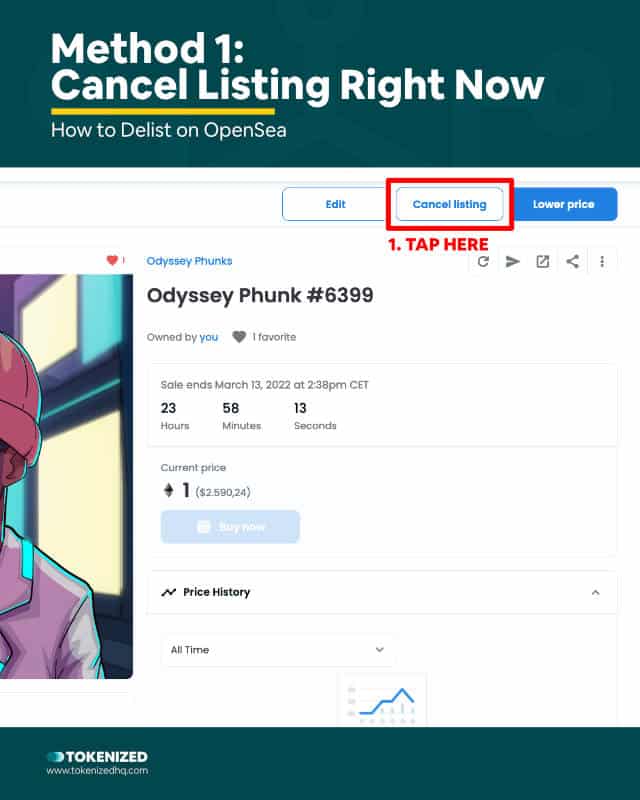
The easiest and most immediate way how to delist on OpenSea is to simply cancel the listing.
WARNING: Doing this requires a gas fee in order to make the item unavailable for purchase to other users.
Here are the steps you need to take if you want to cancel your listing:
Step 1: Click “Cancel listing”
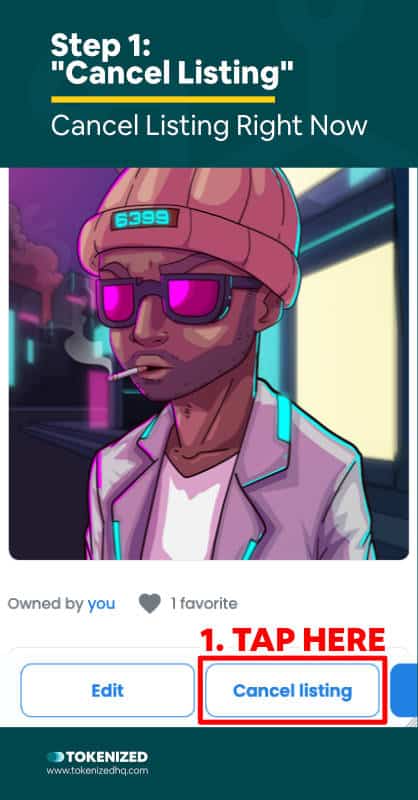
Browse to the NFT’s item page and click the “Cancel listing” button in the top right corner.
Step 2: Confirm the cancellation
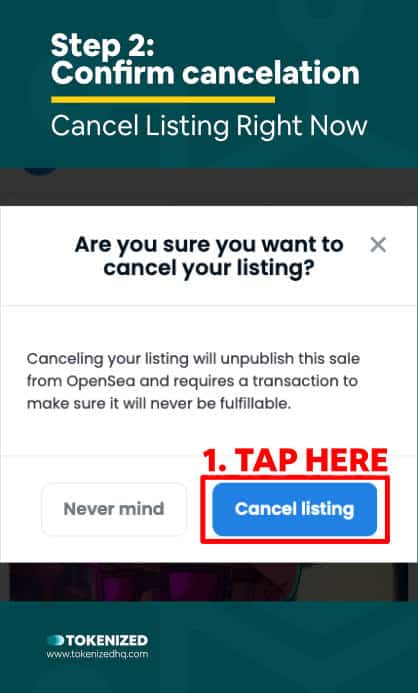
Once you hit the “Cancel listing” button, you’ll be presented with a popup window asking you to confirm whether you really want to cancel the listing.
If you want to proceed, click the “Cancel listing” button again.
Step 3: Confirm transaction
After confirming the cancellation, your wallet will be triggered.
It will estimate the gas you’ll have to pay and you must confirm the transaction.
You can still change your mind at this point and simply reject the transaction.
You might think it’s expensive to cancel your listings but bear in mind that active contract approvals can also be an attack vector for malicious actors.
That is also why we always recommend that everyone learns how to use Revoke Cash to avoid having unlimited allowances on their tokens.
Method 2: Wait for the Listing to Expire
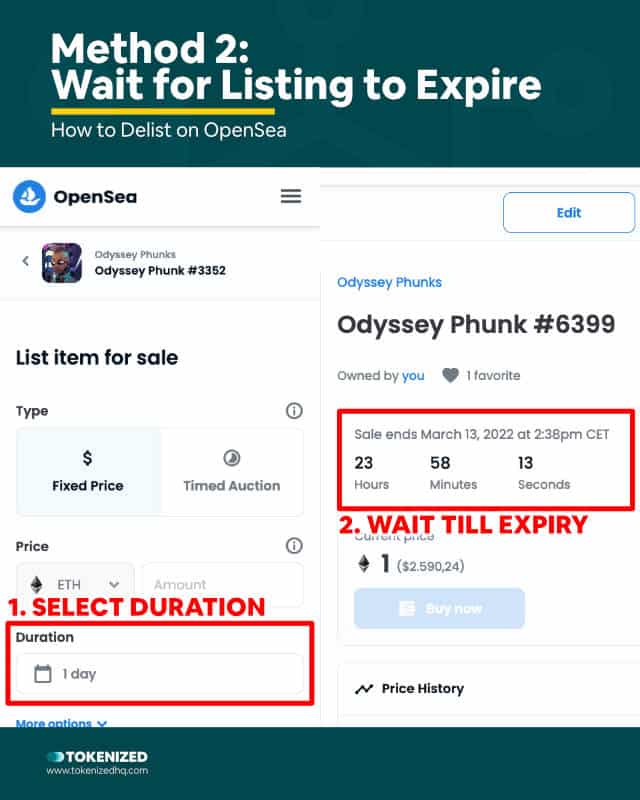
Let’s move on to the next way how to delist on OpenSea.
If you want to avoid paying gas for delisting an NFT you can do so by simply setting a short expiry date.
A lot of people find this inconvenient because it requires them to re-list their NFTs on a regular basis.
However, since listing an NFT is for free on OpenSea, it’s probably the best solution out there.
In fact, you really shouldn’t be listing your NFTs unless you really want to sell them soon.
Listing NFTs long-term is actually detrimental to price action because it generates an artificially high supply and creates price ceilings that act as resistance.
We recommend that you only list when you actually want to sell and limit the listing’s expiry date to 3 days or 1 week at most.
Method 3: Delete Your NFT Completely
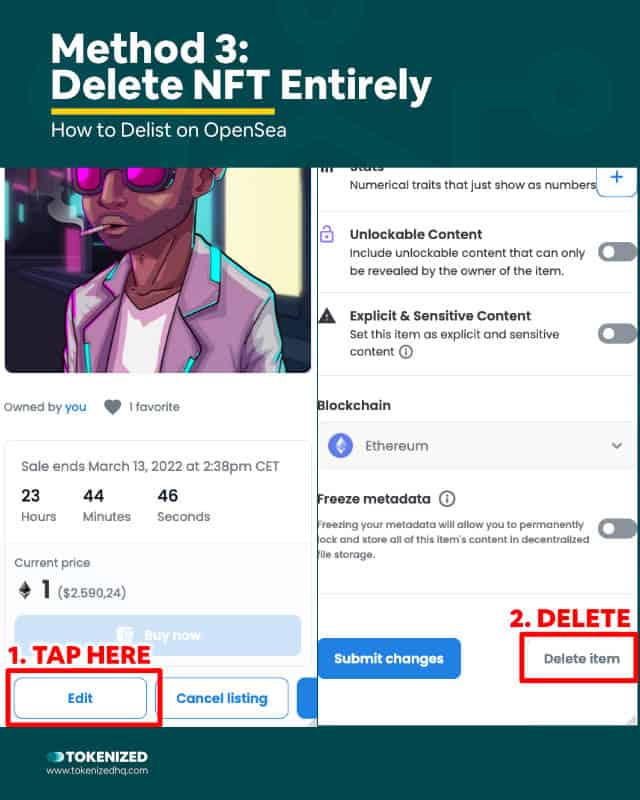
Now it’s time to look at a very different way how to delist on OpenSea.
Things get extremely easy when you’re not just the owner of an NFT but also the creator.
If you’ve created an NFT using OpenSea’s set of tools and listed it for sale, it’s extremely easy to delist it by simply deleting the NFT altogether.
Obviously, this only makes sense if you don’t want to keep the NFT in your wallet.
But if you were just experimenting with creating your own NFTs and now want to remove them, deleting the NFT will not just cancel the listing but also burn it completely.
Delisting by Transferring to Another Wallet
You should never try to delist an NFT by transferring it to another wallet unless you are absolutely certain that you will never use the original wallet again. If you do, you are putting your NFTs are at risk.
WARNING: This is NOT how to delist on OpenSea. This method is NOT recommended because you could lose your NFTs to “hackers” who know how to exploit this technical weakness.
It was previously very popular amongst many NFT investors to simply transfer NFTs into another wallet (wallet A to wallet B) and thereby invalidate the original listing because the NFT is no longer present in the wallet.
Check out our guide on how to use the OpenSea transfer NFT feature for details on how that works.
It seemed advantageous to do so because the associated gas fees were much lower.
However, the problem with this method is that the listing in the original wallet (wallet A) is never actually canceled and remains active indefinitely.
So, as soon as you transfer the NFT from wallet B back to wallet A, the old listing is valid again and can be executed.
This is precisely how a lot of lazy owners of Bored Apes lost their precious NFTs.
The NFTs were sold at ridiculously low prices and not at market value, simply because the old list price has never been canceled.
It’s really important that you understand how to protect yourself against these exploits because we all know that there is no OpenSea refund policy!
Conclusion
Let’s face it, most of the people investing in NFTs right now are looking to make money with NFTs.
So it’s absolutely normal for them to list their NFTs on OpenSea.
The problem is that sometimes you change your mind and actually want to hold on to your NFTs for as long as you can.
That’s why it’s important that you understand how to delist on OpenSea.
And it’s even more important that you know which methods will cost you gas and which ones are for free.
Here at Tokenized, we want to help you learn as much as possible about the coming NFT revolution. We help you navigate this fascinating new world of non-fungible tokens and show you how you can integrate tokenization into your own business.



